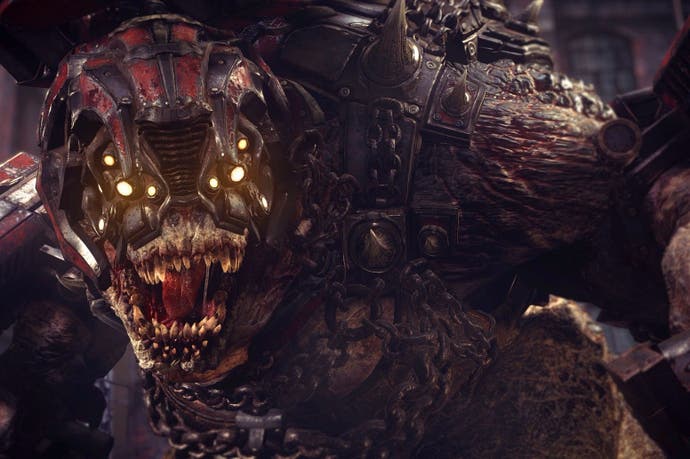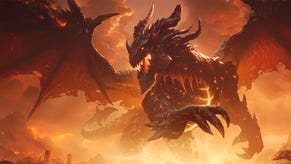What returning to Gears of War says about the series' future
Que sera, Sera.
There's a scene in Generation Kill, the HBO miniseries that follows an embedded reporter as he travels with the Marine Corps' 1st Reconnaissance Battalion during the 2003 invasion of Iraq, in which Sergeant Brad 'Iceman' Colbert can be seen running around a field with his arms outstretched, pretending to be an aeroplane. After watching this display of benign madness, or freedom for a few moments, one of Colbert's comrades turns to the reporter (based on real life journalist Evan Wright) and asks: "What, did you like, give him some Rolling Stone drugs or something?"
"I just asked him what he would be if he wasn't a Marine," says Wright.
The rakish corporal feigns indignation. "Oh my god, he wants to be a ballerina? That's my f***ing dream!"
Gears of War, Epic game's decade-old apocalyptic war game, which has been excavated from the archives, dusted, buffed and polished for re-sale on the Xbox One this week, follows a similarly close-knit group of men, also bound together in conflict with a common foe (in this case, the alien plague of Locust). But it is far too self-consciously macho to allow itself a similar moment of tender joshing or childlike escapism to that of Colbert's plane impression. These beefcakes, with their tree trunk legs and slick-back faces, are a kind of grotesque exaggeration of masculinity, rather than anything approaching real soldiers. They are ex-American football stars. They are steroid-swelled veterans. Their pockets are jangly with the dog tags of fallen comrades. It's no surprise that their favoured weapon is, in fact, a pair of weapons grafted together: a chainsaw spliced with a machine gun - a lumberjack reimagining of the rifle-plus-bayonet combo of centuries past. These guys wield weapons-squared.
They are the sort of comic book supermen who exclaim 'Nice!' whenever they pick up a fresh grenade. They share a brick shithouse build (skinny conscripts are, seemingly, as unwelcome as homosexuals in this army). They are most certainly not the kind of men who dream of being aeroplanes loop-de-looping over some fairer field. It's all a bit exhausting. Still, despite the laughable and interminable braggadocio, this remains, like so much wartime fiction involving a band of brothers, a love story at heart. Exhibit A: in Gears of War one revives a beleaguered teammate with nothing but a reassuring rub to the shoulder.
It is, perhaps, a little churlish to criticise Epic's one-note, testosterone-fuelled portrayal of its characters, especially by way of comparison to David Simon's TV work, which depicts the nuanced complexity of the all-male military unit better than just about anything. But that's only because, in the hands, Gears of War still feels pleasingly fresh and contemporary. The agreeable heft of the Unreal engine (which, lest we forget, the original game was partly made to advertise and sell) is undiminished by time. So too is the snippy combat, which has you flitting between bits of masonry in a cover management puzzle, before sticking your head above the wall or around the door to pop off a few rounds. Epic's interactive design, an Americanisation of Shinji Mikami's foundational third person combat work in Resident Evil 4, remains taut and pleasing. And the level design funnels you through tight corridors and into round, wide open spaces, giving each skirmish unique texture and character and building a memorable rhythm to the fights.
The game's set pieces, unlike some of Call of Duty's big show numbers, are more than mere canned sequences. The moment you train the laser sight of the Hammer of Dawn on a giant clicking crab, summoning a shaft of hot light down from the heavens, has lost none of its impact with the passing years. So too is your first tussle with a Berserker, a blind monster that could have been plucked from Greek myth as it sniffs the air and tilts its head to listen, before charging toward the position at which it perceives you to be (and where, invariably, you are). You must sidestep its advances at the final moment, like the bullfighter whipping away the red rag, using the monster's door-shattering attacks to open up new pathways of escape. These are game design clichés, maybe, but thanks to Epic's exemplary execution, they feel agreeably novel. The relentless pitter-patter of gruff, limp dialogue seems terribly antiquated by comparison.
Despite Microsoft's apparent hard work to upgrade the game's graphics, Gears of War, like so many similar re-masters, looks much the same in its update as it did when it was merely a memory. You don't notice the sharper models and more detailed environments because, in the original, your brain already smoothed things over. There's no gasp of amazement at how improved everything looks. Only a mild feeling of bemusement at the idea that this somehow wasn't how it always looked. (Although, in this particular case, you do notice the upgraded roll manoeuvre, which allows you to tumble in any directions, rather than the four of the compass). Aside from the re-texturing work, Gears of War presents a detailed, dark brown vision of the apocalypse. It could never be described by anyone other than software engineers or marketers as beautiful.
More worthwhile is the inclusion of five new chapters, inserted into the last of the game's seamlessly flowing five acts (each lifted from the PC port of the game) and the much-vaunted multiplayer portion. Here the sixty frames per second upgrade delights, while the inclusion of all of the add-on and PC-only maps (bringing the total number of maps to 19) is perhaps where the game's greatest value is to be found. With dedicated servers, matchmaking, customisation options, extra unlockable characters, new modes and control tweaks, Gear of War's team sport mode offers a welcome taster to what we might expect with the fourth game in the series.
Nevertheless, this revisiting also asks more difficult questions of the series' future. These dull and gruff characters may have developed in each new sequel, and that process looks set to continue in the fourth game. But the series' story, as well as its internal mechanics, are inevitably constrained by the foundations that were laid down by this debut. Could it be possible to swap these preposterous men for more multifaceted options, or to drop the uncomplicated Marine-hero worship, or to eliminate the constant need for a nearby waist-high wall in every scene? Just as Call of Duty continues to wrestle with the problems of long-term success in an iterative series (namely, how to innovate enough to spark interest, without destroying that upon which the game's success is built) so Gears of War's designers are surely having a hard time knowing how to build something that, in philosophical terms, goes beyond this kind of re-visitation of the past.











